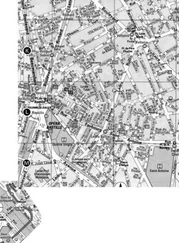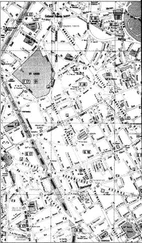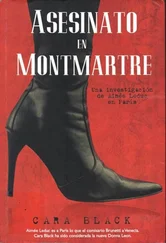A sound like the muffling of a receiver came over the line. Choking.
“Aimée, don’t. I’m OK—” said René.
The line went dead.
She panicked. Stupid, stupid, stupid! Let them have all her money, the jade . . . anything to get René back.
How could this be happening? Thadée shot to death, then the jade stolen, the RG tracking her, and now René, kidnapped! She hit the call back number. It was René’s own cell phone. No answer. Smart.
Her head whirling, she had to figure something out and rescue René. She thought of his hip and . . . didn’t want to think of what they could do to him.
Calm down . She had to calm down.
They’d call back. And she’d arrange to meet them. Try and convince them to accept the fifty thousand franc check and call it quits.
They’d let her stew before calling to give her the “drop.” But what if they never handed René over? Terror clutched her.
Never rely on criminals to do the expected.
She thought of Louis; “Nut,” as she and René had nicknamed him since he kept bags of nuts in his pockets at all times, saying he was determined to eat healthily in the radar infested world he worked in. They’d met him at an electronics seminar when they’d skipped out of Sorbonne classes.
He worked at France Télécom. He’d know a way to trace the kidnappers, if anyone did. She dialed.
“CPMS division.”
“ Bonsoir , Nut?” she said, pulling on jeans and a worn cashmere sweater from the office armoire.
“Aimée . . . hold on,” Nut said. She heard beeping in the background. Clicks. “ Ça va? I’m the night network supervisor, so I need to monitor transmissions and take calls.”
“I’ll make it quick,” she told him, keeping her voice steady with effort. “Triangulation, can you do it?”
“To a land line or cell phone?”
“René’s cell phone. He’s been . . . kidnapped.”
“You’re joking.”
“I wish,” she said. ”Listen, no time to explain but. . . .”
She heard him take a deep breath.
“Only in Paris within the service antenna’s or tower’s range,” Nut said. “No suburbs or outlying districts. Paris maintains multi-antennas. Even so we’ve had only limited success. Montmartre and the Butte Chaumont hill give us trouble.”
“Will you try?” she asked, turning off her computer, switching off the lights.
“Picking through voluminous CDR records and verifying the data from the base stations which pick up calls to reconstruct and pinpoint the whereabouts of phone users, that’s worse than dental extraction. And more time-consuming.”
“I can give you the number to trace,” she said.
“That lessens it a bit but not enough,” Nut said.
She heard beeps and clicks in the background.
“Talk to a ham radio operator,” he advised. “They monitor cell phone transmissions all the time.”
“René needs help, right away. There’s no time to lose.”
“Go to Club Radio, 11 rue Biot,” he said. “Tell Léo I sent you. That’s the best I can do, Léo helped another friend last week. And don’t forget, Aimée.”
“That I owe you?”
“René’s a black belt. Give him some credit.”
Nut clicked off.
Fear rippled through her as she stepped into her boots and grabbed her knee-length suede shearling coat in the hallway. She ran down the stairs, onto rue du Louvre and found a taxi letting out passengers.
“Eleven rue Biot,” she said to the taxi driver.
“Clichy’s out of my way.” The driver shook his head. “They were my last fare. Sorry, I’ve been working since six a.m.”
Lights glittered on the Seine below. A passing barge churned the black, sluggish water. No other taxis in sight.
She reached for her wallet. “Fifty francs extra for your trouble.”
“Must have a hot date.”
Little did he know.
The taxi driver hit the meter switch. “Get in.”
NUMBER 11 RUE Biot, between the old Café-concert L’Européen, where Charles Trenet had sung in the thirties, and an Indian restaurant, was a cobblestone’s throw from Place de Clichy. She pressed the buzzer, the door was buzzed open, and she stepped into a small courtyard. Against the night sky, a row of antennas poked from the rooftop like twigs: a good sign. She passed the old stables, now garages, and mounted the back stairs to the second floor.
The door stood ajar. She walked inside to what she figured had once been two rooms that had been opened up into a large space. Bare putty-colored walls, a wooden farm table, a bag of potting soil on the floor. Instead of the buzzing and static she expected, she saw a plump woman in her forties wearing an apron, sitting at a scanner by several radios. She wore headphones.
“I’m looking for Léo. . . .”
“Short for Léontyne,” she said, smiling. “My mother loved opera and Léontyne Price.”
“Nut sent me.”
“I know,” she said. “Can you hurry up? Sorry but I’ve got to add forty-five megahertz in about seven minutes.”
She gestured to a large red clock, and pulled off her headphones.
Aimée nodded. “I don’t know if my friend’s in Paris, but he’s in trouble. I’m desperate. Can you help me find him?”
Léo hit several switches and adjusted a black knob that caused a needle to quiver on the volumeter.
Aimée wrote René’s name and cell phone number on a pad of paper by Léo’s elbow.
“ Parfait! Most people don’t even have that much. Now we can tap into the ocean of dialogue, ignore the police bandwidth, firefighters, ambulance drivers, paramedics, sanitation workers, and infant monitors and pinpoint it. Like they say, it’s an electromagnetic jungle out there.”
Aimée was out of her depth. “How does it work?”
“I set up a system for this phone’s ESN and MIN code, its serial number and identification number. So each time,” she paused, rubbing her neck, “René . . . that’s his name, René?”
Aimée nodded.
“So when René makes a phone call, my scanner picks up his ESN and MIN numbers, my computer, hooked up to my scanner, recognizes his cell phone, and tunes in to his conversation and records it.”
“Sounds easy. But I’m sure it’s not.”
“So far there’s no encryption in the radio spectrum,” she grinned. “When it happens, we’ll figure something else out.”
“And if the phone’s not on?”
“I can only monitor what’s out there.”
Aimée paused looking around the room filled with radios. She clenched her fists, trying to keep her hands still, to keep her nervousness in check.
“His kidnappers used his phone once. To call me on my cell phone.”
Léo’s smile vanished. “Kidnappers?”
“How closely can you track, Léo?”
“Well, during the Occupation the Nazis found hidden British crystal radios transmitting from cellars. This operates on the same basic principal. But the Nazis had roving trucks with tracking equipment to follow the signals and triangulate. Primitive, but it did the job. Stationary antennas have limitations; it depends on the signal and relay time. Keep them talking.”
“What if I can’t?”
“You must. If he’s in Paris—and we don’t have an electrical storm—the longer the phone call, the closer I can pinpoint. If the gods smile, not only the street but the building.”
“ Merci, Léo,” she said. “I’ll owe you.”
“Don’t thank me yet,” Léo said.
On her way out, Aimée noticed the wheelchair folded by the door, and end of a metal hospital bed peeking from behind a draperied alcove. Aimée wondered when Léo’d last been out of this apartment. But then, she traveled through Paris every night. Riding the airwaves.
Читать дальше











